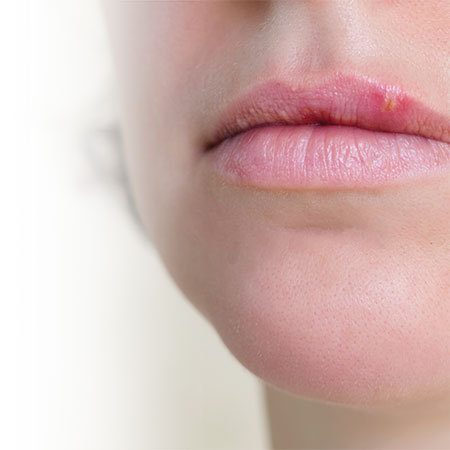Carriers of the herpes labialis virus sometimes have cold sores. What can you do to reduce the risk of having one?
Unpleasant surprise: a cold sore!
Have you ever had a cold sore at the most inopportune time? It’s as if the herpes labialis virus (responsible for cold sores) had a sixth sense, capable of causing a flare-up at the worst time: the morning of a school picture or an oral presentation, just before an important appointment (e.g., a job interview), the day you leave for your vacation, etc. Regardless of the moment, realizing you are getting a cold sore is never pleasant!
Did you know that certain lifestyle choices can, on the one hand, influence the risk of contracting the herpes labialis virus and, on the other hand, influence the risk of a flare-up if you are a carrier? That’s right! Why not try to take control of this annoying killjoy?
Here is some information and advice that we hope will be useful to you.
First: avoid contracting the virus
The herpes simplex virus 1 (HSV-1), responsible for herpes labialis, is extremely contagious. It is transmitted through close contact between individuals or contaminated objects. The virus remains dormant in the body during the latent phase, and can potentially reactivate itself in the form of a lesion (cold sore).
Individuals infected by the virus remain carriers throughout their lives. Sometimes, months, even years pass before a flare-up occurs.
HSV-1 is transmitted through close contact with an individual who excretes the virus. The virus is usually excreted through lesions, but it can also be transmitted without any apparent lesion, especially in the hours leading up to a flare-up.
The following tips will help you to avoid being contaminated by HSV-1.
- Avoid close contact, such as kissing, with a person who has a cold sore.
- Wash your hands regularly, especially if you are in contact with an infected person. If you live with this person, remind him or her to wash their hands often.
- Pay attention to objects that could be contaminated, such as lipstick, utensils, a straw, glass, cup, cigarette, etc.
- Maintain good personal health practices by putting emphasis on physical exercise and quality sleep. Avoid stress and overwork.
- Adopt healthy eating habits. A healthy diet promotes a healthy immune system.
- Use a condom during sexual intercourse. HSV-1 can be transmitted through oral contact with genitalia.
Secondly: Avoid or control triggers
Once you are a carrier of HSV-1, a number of factors can promote a flare-up of herpes labialis.
Exposure to the sun is one of the most significant triggers. This may have happened to you: you take some sun, and suddenly, the next day or a few days later, you get a cold sore. Effective sun protection helps to prevent a cold sore flare-up.
Here are some useful tips:
- Avoid sun exposure as much as possible. Look for shade, especially when the sun’s rays are at their strongest (between 11:00 a.m. and 4:00 p.m.).
- Wear a large-brimmed hat.
- Regularly apply lip balm with a sun protection factor (SPF) of at least 30.
- Avoid tanning beds at all costs.
The virus often gets the upper hand when the immune system is weakened. Among other well-known triggers, note:
- infections (e.g., cold or flu)
- fever
- fatigue and stress (physical or emotional)
- illnesses that cause suppression of the immune system
- drugs or other treatments with this type of effect (e.g., chemotherapy, radiation therapy, etc.)
Additionally, a herpes labialis flare-up can be caused by the following factors:
- menstrual cycle (or premenstrual)
- exposure to wind or the cold
- a mouth sore (e.g., excessive dryness, lip biting, dental work, etc.)
Here are some additional tips to avoid reactivation of the virus and a flare-up of herpes labialis.
- Protect your lips. Use lip balm regularly to avoid dryness.
- Place a scarf over your mouth when it is cold or windy.
- Do not bite your lips.
- Avoid stress and fatigue as much as possible.
- Avoid contact with individuals who have a cold or the flu. Wash your hands often.
Don’t hesitate to speak to your pharmacist for additional information about the prevention and treatment of herpes labialis.

